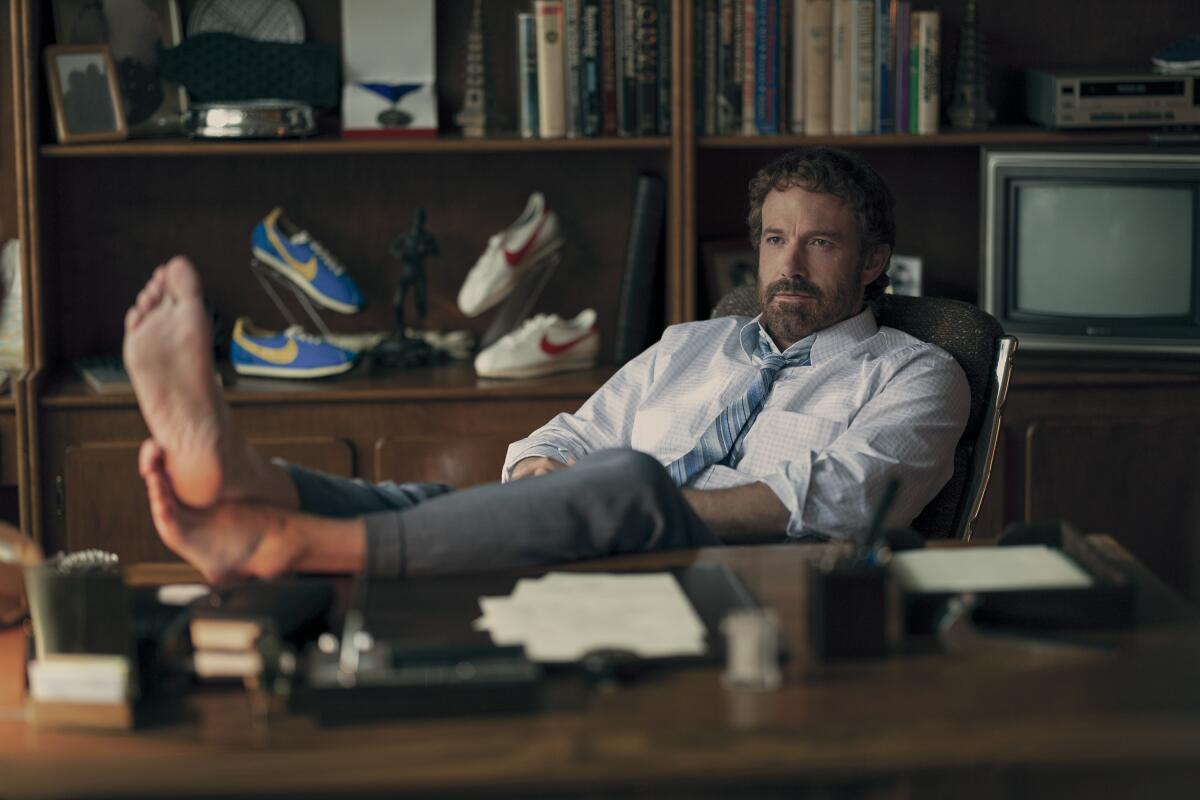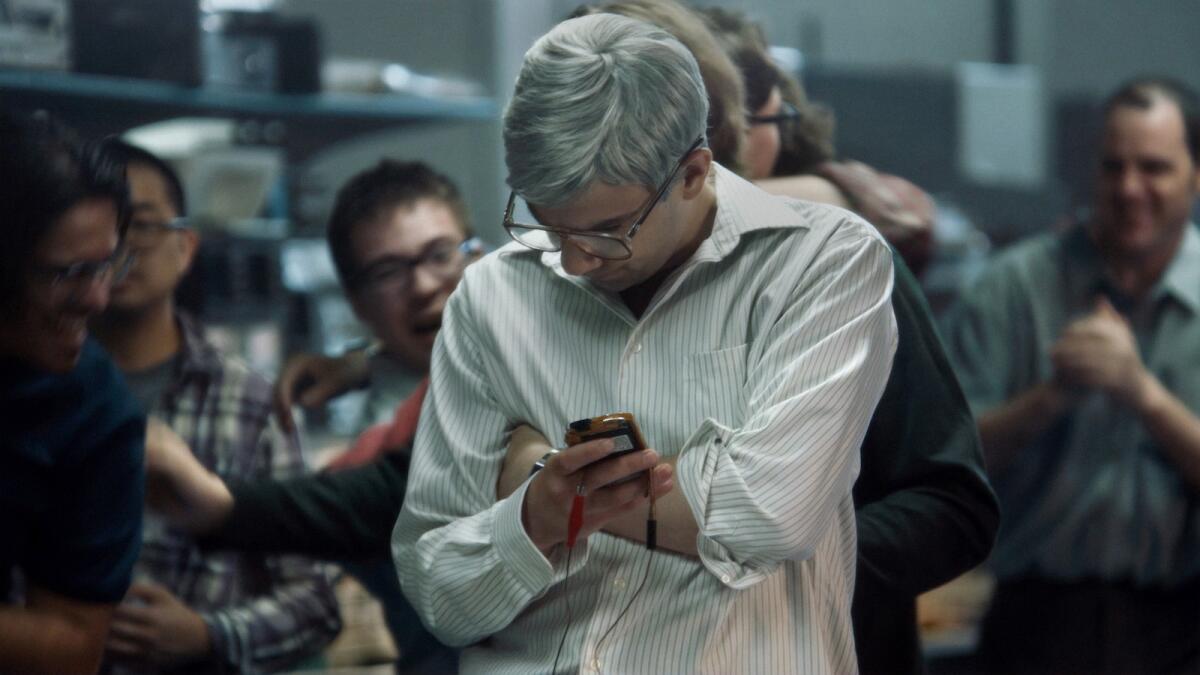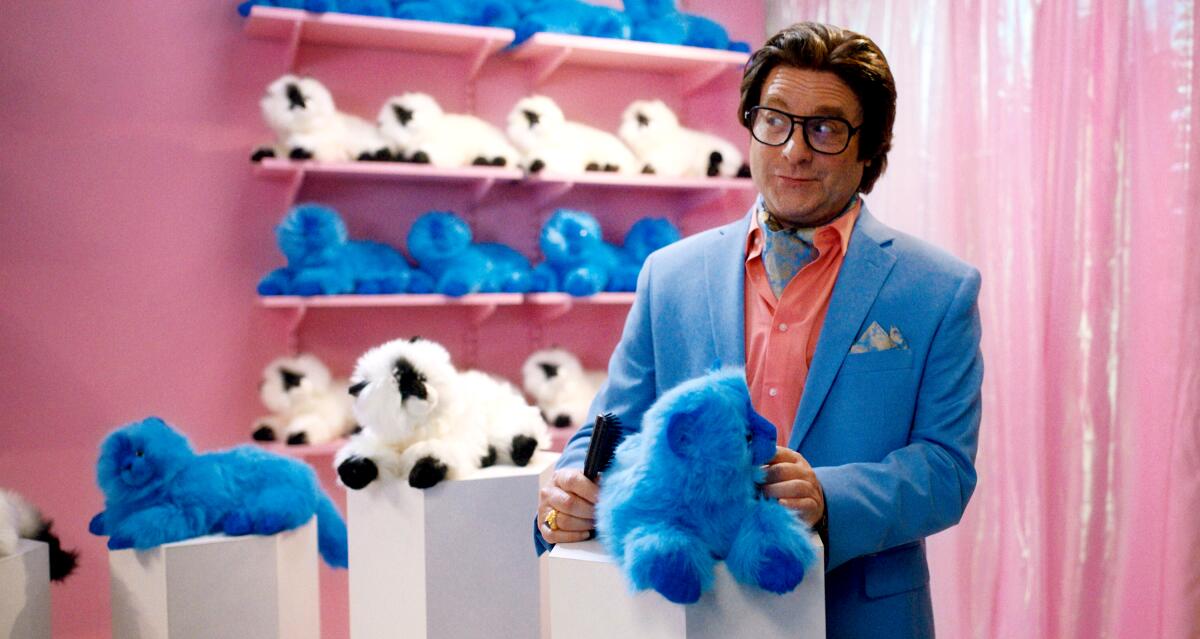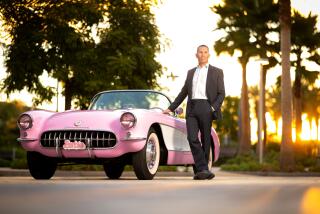Big interest in big business on movie screens this season

One of the reasons we go to the movies is because they’re not work. Yet in 2023, a number of films about business were among the most entertaining, and accomplished, of the year.
“The Burial,” starring Jamie Foxx, turned a real-life battle between a family and corporate funeral home operators into a satisfying display of courtroom fireworks. Director Eva Longoria made the creation of spicy snacks into a celebration of Latino ingenuity with “Flamin’ Hot,” although the veracity of its story has been questioned. “Tetris” approached the international rights deals for the pioneering video game like a Cold War espionage caper. And is it any surprise that linking big money to battles of the sexes paid off for purely fictional films, whether with (“Fair Play”) or without (“Barbie”) genitalia?
“Air,” “BlackBerry,” “The Beanie Bubble” and “Dumb Money” took docudrama approaches to real business phenomena. With their emphasis on character, comedy and cultural implications, though, subjects such as cellphone engineering and online investment became unexpectedly watchable.
“Entertainment comes first,” says “BlackBerry” director Matt Johnson, who co-stars in the film as Canadian smartphone maker Research in Motion founder Doug Fregin. “The fact that I knew nothing about cellphones and didn’t have an ax to grind meant that I didn’t get bogged down with the technical side of why this product was revolutionary, et cetera. I could just focus on the things that to me were entertaining.”

The rise and fall of the market-dominating (until the iPhone came along) BlackBerry is told through its impact on RIM’s eccentric executives, who included socially inept tech genius turned corporate overlord Mike Lazaridis (Jay Baruchel) and the company’s Napoleonic financial guru, Jim Balsillie (Glenn Howerton).
“You’d be shocked to hear how much our lawyers made us tone them down,” Johnson says of the executives’ unhinged, actual behavior, adding that the cautionary tale’s appeal “is connected to great, mythic stories of people who have lost, guys who because of their flaws can’t stay at the top.”
“Air” soars on character too, although not the person’s you’d expect. We never actually see the face of the actor who plays Michael Jordan in this recap of the industry-changing deal for the Air Jordan shoe line. Rather, what’s foregrounded is the determination of minor Nike executive Sonny Vaccaro (Matt Damon) to sign the rising basketball superstar, along with able support from a top-of-their-game acting team that includes Viola Davis, Chris Messina and director Ben Affleck as Nike boss Phil Knight.
“Air” was Alex Convery’s first produced screenplay. We asked how working out contract points could possibly fascinate viewers.
“My gut answer would be: It’s just all about character,” says Convery, who met with the real-life Vaccaro between script drafts. “Are the characters entertaining, is there conflict and does the audience care?”
While conceding that being about one of the greatest athletes — and still beloved products — in the world helps, the writer believes detailing Nike office politics was crucial to this high-flying success story.
“Everyone wakes up in the morning and has to go to work somewhere, or has had experience doing that,” Convery says. “There’s no world-building, you don’t have to explain anything about going to an office. That can humanize it.”

There was a time in the late 20th century when Beanie Babies challenged Air Jordans as America’s favorite product. “The Beanie Bubble” charts the speculative trading mania that exploded around the little toy critters, which was weird enough to amuse in its own right. However, married co-directors Kristin Gore and Damian Kulash Jr. used the fad to examine issues ranging from workplace gender disparities (Zach Galifianakis plays the mercurial toy company’s CEO and Elizabeth Banks, Sarah Snook and Geraldine Viswanathan the women he screws over) to how the internet impacted commerce.
“The fact that one of the biggest absurd crazes in American history involved these little $5 beanbag animals just seemed like a colorful, bizarre playground for these larger themes that we were trying to get at,” says Gore, a former “Saturday Night Live” writer who also wrote “Beanie Bubble’s” screenplay. “The women’s stories were our north star that we wanted to highlight, but the narrative contained the seeds of where we are right now. In the ‘90s, so much changed with the advent of eBay, the rise of internet marketing and the complete rewiring of communication and culture by everything that the internet wrought — and is continuing to wreak.”
“Despite the fact that there’s a product involved, ours is a pretty anti-consumerist film,” adds Kulash, who’s also the frontman for rock band OK Go. “The biggest changes in our society in the past 20 to 30 years seemed to happen at a technological, and therefore often corporate, level. Everyone’s sort of wondering how we got here.”

The internet is used to save a dying business, the GameStop video game retail chain, from a stock shorting squeeze in “Dumb Money.” Whereas the kaleidoscopic look at the 2021 effort by millions of small investors to raise the company’s value against hedge fund speculators echoes the landmark finance movie “The Big Short,” director Craig Gillespie (“Cruella,” “I, Tonya”) came at this complicated numbers game from a personal perspective. His son Miles, who was living with Gillespie during the frenzy, was a GameStop investor.
“Going on that emotional journey with him was my way into this film,” the director says. “It was much more from the outside looking in, which was quite different from a lot of the Wall Street films we’ve seen. What was really at stake, that real sense of wealth disparity in our country at the moment — the sense that everything is rigged against the average person — were all things that I found incredibly compelling for this story.”
With a crack ensemble that could wring humor out of daunting calculations — Paul Dano, Seth Rogen, America Ferrera among them — “Dumb” was adapted from Ben Mezrich’s nonfiction book “The Antisocial Network” by former Wall Street Journal reporters Lauren Schuker Blum and Rebecca Angelo. The film rigorously tried to make sense of both the digital and financial chicanery that went down. Test audiences wanted something else, though.
“I had a lot more information in it at the first screening for friends and family,” Gillespie recalls. “I thought the audience would want to know more financial details and what the daily trading was doing. But it became like homework, so we started to strip it out and see just how much you needed to know to stay emotionally invested. That was a very tricky balance, but whether you’re talking about the stock exchange or how Apollo 13 got back to Earth, the audience doesn’t have to understand it necessarily but needs to know that the characters understand it.”
Although it’s primarily a timing coincidence that all these business movies came out this year, filmmakers do detect other reasons, both cultural and commercial, for the trend.
“There’s a cynical answer, which is that the natural IP inside of all products has a certain marketing angle that raises awareness, which makes film distributors’ jobs easier,” Johnson notes.
“The internet and the access that we have gives us more interest and insight into these things than you could have had 40 years ago,” Convery says of our “Succession” and “Suits”-bingeing age.
But maybe Americans’ evolving love/hate relationship with their jobs is the key factor.
“The outsider being able to have a huge success with an idea is very American,” Australian Gillespie observes. “But COVID may have led to a reassessment of priorities in life, the Great Resignation that happened in 2021. Maybe that plays into it; seeing individuals do that in these films is something that resonates.”
More to Read
From the Oscars to the Emmys.
Get the Envelope newsletter for exclusive awards season coverage, behind-the-scenes stories from the Envelope podcast and columnist Glenn Whipp’s must-read analysis.
You may occasionally receive promotional content from the Los Angeles Times.






